Novels, poems and essays by Fugard
Karoo and other stories, 2005. Short stories
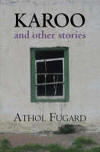
A collection of short stories set in the Karoo (Buks and Joseph, Lukas Janties, Klonkie, Johnnie Goliath, Katie Koopman, Booitjie Barends) together with excerpts from Fugard's notebooks. One of the stories, Booitjie Barends, is the basis for Fugard's play Booitjie and the Oubaas. The book is also quoted in Coming Home.
The photos are also by Fugard,
including the sublime cover photo.
Occasional Poetry, 1986. Poetry
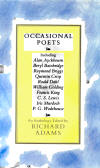
An anthology of poetry by
novelists and playwrights. Fugard
contributes six Haiku, which are not particularly
impressive. The best is:
Lucky night-borne midge
Crawling across 'yesterday'
The ink is dry.
Other contributors include
Coetzee and Golding, Doris Lessing and Jean Rhys,
C.S. Lewis and Arnold Wesker. Alan
Ayckbourn provides the nicest, "Cat
crouching", whereas Golding shows he is a
good novelist and a bad poet.
Tsotsi published 1980, written 1959-1960. A novel
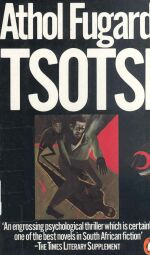
A sort of Township novel.
There are some similarities with Graham Greene's
Brighton Rock, in particular the vicious hero,
but it soon turns to sentimentality. There are
good parts
it felt as if his feet and
his heart were pointing in opposite directions
but it is overlong and too wordy, for example
His Sunday night now, come
in a warm cloud of smoke and darkness in the
streets and moths raging in soft storms around
the lamps
etc for another 15 lines.
Another view is "The novel is stark in its realism, the social conditions it describes are appaling, and the mastery of fictional techiques maks it clear that if [Fugard] had not chosen the theater he probably would have had an equally distinguished career as a novelist" (African Literatures in the 20th Century, General Editor Leonard S. Klein).
Tsotsi means "black
hooligan".
Notebooks 1960-1977
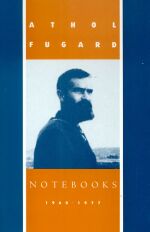
This is a major source of information on
Fugard- his jottings and ideas. As always
he is very open about his writing. On Hello and
Goodbye "A question I can't fully answer
(yet? ever?): what is it that draws Johnnie to
the crutches".
Cousins. A Memoir 1994
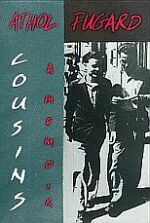
Cousins is the first (and so far only) part of four autobiographical sketches. This covers two cousins from his childhood, Johnnie and Garth.
I remember my childhood as a time of secrets...in a variety of disguises everything I have written has been an attempt to share secrets with you
The memoir is interesting, but it is also a
defence mechanism by Fugard. If he wrote an
autobiography then chronology would force him to
cover all areas of his life. By choosing episodes
he reveals only what he wants. Even so he is
evasive "for various reasons parental
supervision of our free time was very lax".
Books about Fugard
Athol Fugard 2003
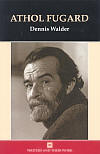
Dennis Walder's literary biography of
Fugard. Walder also wrote the first book on
Fugard in 1984.
Gadamer, History, and the Classics : Fugard, Marowitz, Berkoff, and Harrison Rewrite the Theatre 2002
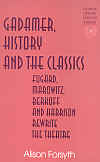
Alison Forsyth in Studies in Literary
Criticism and Theory, V. 15. 42 pages on
Fugard "Antigone, Fugard and ´The Tradition
of the Oppressed´".
Amid Our Troubles 2002
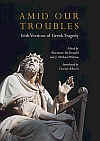
editors J. Michael Walton and Marianne McDonald
"This collection of provocative
essays reveals how some of the great Irish poets
and dramatists, of the past and present, have
drawn on Greek myths and used these stories,
which have travelled across three thousand years,
to bring new insights on the world in which we
now live.
Including essays from, amongst others, Athol
Fugard, Seamus Heaney and Tom Paulin Amid Our
Troubles looks at the work of such writers as
Marina Carr, Brian Friel, Brendan Kennelly, Frank
McGuinness and W. B. Yeats. "
Writers in Conversation 2001
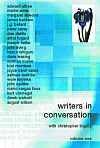
Volume One with Christopher Bigsby.
An interview with Fugard (12 pages) as well as 21 other writers including August Wilson, Doris Lessing, Wole Soyinka, James Baldwin, Salman Rushdie.
"- Can you explain to me why
it is that in most of your plays there are only
two or three characters?
- I am a miniaturist- that is the size of the
canvas I can fill. I don't think I would
know how to fill a bigger canvas. The
thought of a play with seven or eight characters
intimidates me"
The Dramatic Art of
Athol Fugard:
from South Africa to the World 2000
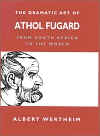
Albert Wertheim's biography of Fugard. Very good on both Fugard and his work.
"In its final and advanced lesson, My Children! My Africa! teaches its difficult truth, a truth that is as applicable to education and social change as it is to theatre: mere words devoid of actions or feelings are empty rhetoric; mere actions devoid of words or reasoned thought are mayhem... Mr. M stands in his classroom holding his dictionary in one hand and a rock that has been thrown through his window in the other. Each symbol by itself represents a worthless approach..."
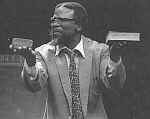
Athol Fugard and Barney Simon 1999
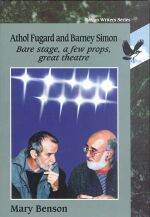
The sub-title, Bare stage, a few props, great theatre is a quote by Fugard to Simon on what they required for their next performance. A book about the author Mary Benson's friendship with Fugard and Simon. Enjoyable, well written with good insights and recommended.
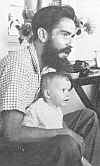
"The group's first performance had
been given in an abandoned snake-pit at Port
Elizabeth's museum and snake park; they decided
to call themselves the Serpent Players"
Master Harold... Casebook 1997
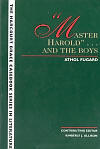
The full text of "Master
Harold"... and the Boys plus a good
selection of reprinted articles to help the
student. The articles cover the play, South
Africa, Athol Fugard, racism etc. There are
also interviews with Fugard and with Zakes Mokae.
Modern Drama from Ibsen to Fugard 1992
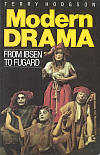
by Terry Hodgson. An
overview of drama with one chapter (9 pages) on Fugard. Good general information.
File on Fugard 1991
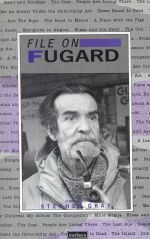
A short guide to his works by Stephen Gray. A summary of all the plays up to My Children, with excerpts from contemporary newspaper reviews.
"Mr. Fugard´s two earlier plays,
No-Good Friday and Nongogo, had plenty of real
meat in them. The Blood Knot is the finest so
far. The problem is: where can such a play find a
wider audience? Perhaps, like No-Good Friday, it
will have to travel to Rhodesia, but its true
home and greatest impact must surely lie
here" (1961)
Athol Fugard A Bibliography 1991
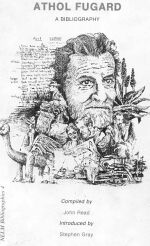
A bibliography by John Read. A
summary of reviews of Fugard, up to My Children!
My Africa!
Characters 1989
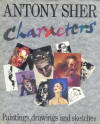
Drawings by actor Antony Sher, including two of Fugard.
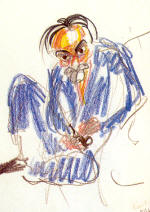
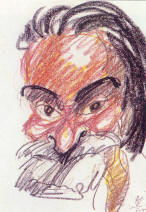
Truth the hand can touch 1985
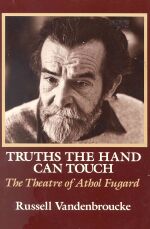
A major literary biography by Russell Vandenbroucke. This covers Fugard´s work up to the 1980s and Master Harold.
"While Fugard has never left South Africa for a long period, like Genet he is a kind of exile in his own home, estranged from the mainstream of life around him"
"In nearly every work an insecure
character tries to find his identity and assert
the dignity inherent in his humanity"
Athol Fugard 1984
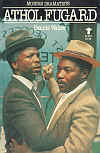
The first full-length study of Fugard by Dennis Walder. The plays up to Master Harold. There are good insights into the works
"All Fugard´s plays approximate to the same model established in The Blood Knot: a small cast of ´marginal´ characters is presented in a passionately close relationship embodying the tensions current in their society"
and it also has some good criticism:
"...he adopts the role of white man without whom, it seems, Africans are unable to understand the implications of their own situation".
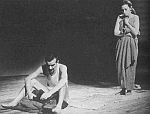
With 12 good photos. The photo
above is of Fugard and Bryceland in
Statements. Note that Walder has written a
new book on Fugard published in 2003.
Athol Fugard 1982
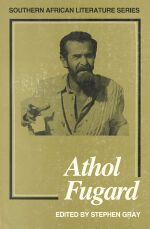
Edited by Stephen Grey. A large collection of essays on Fugard´s work. Very useful.
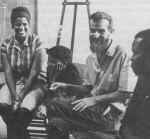
"I have a sense that my most finely
crafted play, just best constructed, is Boesman
and Lena. The play which sort of lurks in my
life, though, ... is Statements after an arrest
under the Immorality Act"
Athol Fugard: A Source Guide 1982
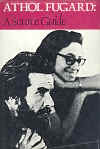
compiled by Temple Hauptfleisch, Wilma Viljoen and Céleste van Greunen. A bibliography, concentrating on South African magazine articles. With a good short introduction.
Tantalisingly Dimetos is mentioned
with audio recordings of the rehearsal (9
cassettes, 14 hours), a recording of the first
production (2 cassettes, 2 hours) and a recording
of the Edinburgh production (1 cassette, 1 1/2
hours).
York Notes on Selected Plays Fugard 1980
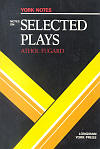
by Dennis Walder (the front page is
incorrectly spelt as Denis). A good guide
for students. A general introduction the
detailed summaries of Sizwe Bansi, Island and
Statements. The commentaries on topics such
as The Play and Image and The Play and Politics.
Sophocles to Fugard 1977
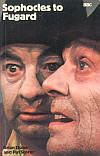
by Brian Stone and Pat Scorer. Short pieces on 16 plays, each of which was produced for the BBC and the Open University. The final play is Sizwe Bansi (6 pages plus photo).
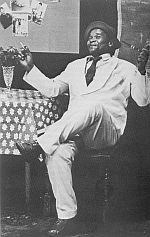
"Not that we need a
play to tell us that apartheid is evil: a
pamphlet could do that better. But to prove
it on our pulses as well as our minds we need the
help of art".
Further books (information on these is welcome):
Athol Fugard: a Case Book by Kimball King.
Published by Garland Science, July 1997.
Exploring the labyrinth : Athol Fugard's approach
to South African drama by Margarete Seidenspinner
1986